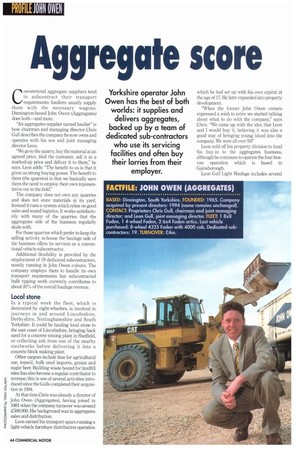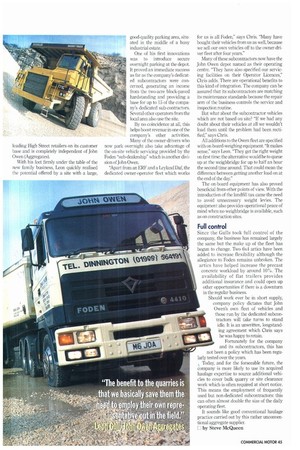Aggregate score
Page 56

Page 57

If you've noticed an error in this article please click here to report it so we can fix it.
Yorkshire operator John Owen has the best of both worlds: it supplies and delivers aggregates, backed up by a team of dedicated sub-contractors who use its servicing facilities and often buy their lorries from their employer.
Conventional aggregate suppliers tend to subcontract their transport requirements: hauliers usually supply them with the necessary wagons. Dinnington-based John Owen (Aggregates) does both—and more.
"An aggregates supplier turned haulier" is how chairman and managing director Chris Gull describes the company he now owns and operates with his son and joint managing director Leon.
"We go to the quarry, buy the material at an agreed price, find the customer, sell it at a marked-up price and deliver it to them," he says. Leon adds: "The benefit to us is that it gives us strong buying power. The benefit to them (the quarries) is that we basically save them the need to employ their own representative out in the field."
The company does not own any quarries and does not store materials in its yard. Instead it runs a system which relies on good sales and sound logistics It works satisfactorily with many of the quarries that the aggregates side of the business regularly deals with.
For those quarries which prefer to keep the selling activity in-house the haulage side of the business offers its services as a conventional vehicle subcontractor.
Additional flexibility is provided by the employment of 19 dedicated subcontractors, mostly running in John Owen colours. The company employs them to handle its own transport requirements but subcontracted bulk tipping work currently contributes to about 20% of the overall haulage revenue.
Local stone
In a typical week the fleet, which is dominated by eight-wheelers, is involved in journeys in and around Lincolnshire, Derbyshire, Nottinghamshire and South Yorkshire. It could be hauling local stone to the east coast of Lincolnshire, bringing back sand for a concrete mixing plant in Sheffield, or collecting ash from one of the nearby steelworks before delivering it into a concrete block making plant.
Other cargoes include lime for agricultural use, topsoil, bulk steel imports, grains and sugar beet. Building waste bound for landfill sites has also become a regular contributor to revenue; this is one of several activities introduced since the Gulls completed their acquisition in 1994.
At that time Chris was already a director of I John Owen (Aggregates), having joined in
1981 when the company turnover was around 1500,000. His background was in aggregates sales and distribution.
Leon earned his transport spurs running a light-vehicle furniture distribution operation which he had set up with his own capital at the age of 17. He later expanded into property development.
"When the former John Owen owners expressed a wish to retire we started talking about what to do with the company," says Chris. "We came up with the idea that Leon and I would buy it, believing it was also a good way of bringing young blood into the company. We were all over 50!"
Leon sold off his property division to fund his buy-in to the aggregates business, although he continues to operate the four-boxvan operation which is based in Gainsborough.
Leon Gull Light Haulage includes several leading High Street retailers on its customer base and is completely independent of John Owen (Aggregates).
With his feet firmly under the table of the new family business, Leon quickly realised the potential offered by a site with a large, good-quality parking area, situated in the middle of a busy industrial estate.
One of his first innovations was to introduce secure overnight parking at the depot. It proved an immediate success as far as the company's dedicated subcontractors were concerned, generating an income from the two-acre block-paved hardstanding and providing a base for up to 15 of the company's dedicated sub-contractors. Several other operators from the local area also use the site.
By no coincidence at all, this helps boost revenue in one of the company's other activities. Many of the owner-drivers who now park overnight also take advantage of the on-site vehicle servicing provided by the Foden "sub-dealership" which is another division of John Owen.
"Apart from an ERF and a Leyland Daf, the dedicated owner-operator fleet which works
for us is all Foden," says Chris. "Many have bought their vehicles from us as well, because we sell our own vehicles off to the owner-driver fleet after four years."
Many of these subcontractors now have the John Owen depot named as their operating centre. "They have also specified our servicing facilities on their Operator Licences," Chris adds. There are operational benefits to this kind of integration. The company can be assured that its subcontractors are matching its maintenance standards because the repair arm of the business controls the service and inspection routine.
But what about the subcontractor vehicles which are not based on site? "If we had any doubt about their vehicles at all we wouldn't load them until the problem had been rectified," says Chris.
All additions to the Owen fleet are specified with on-board-weighing equipment "It makes sense," says Leon. "They get the right weight on first time: the alternative would be to queue up at the weighbridge for up to half an hour the second time around. That could mean the difference between getting another load on at the end of the day."
The on-board equipment has also proved beneficial from other points of view. With the introduction of the landfill tax came the need to avoid unnecessary weight levies. The equipment also provides operational peace of mind when no weighbridge is available, such as on construction sites.
Full control
Since the Gulls took full control of the company, the business has remained largely the same but the make up of the fleet has begun to change. Two 6x4 artics have been added to increase flexibility although the allegiance to Foden remains unbroken. The artics have helped increase the precast concrete workload by around 10%. The availability of flat trailers provides additional insurance and could open up other opportunities if there is a downturn in the regular business.
Should work ever be in short supply, company policy dictates that John Owen's own fleet of vehicles and those run by the dedicated subcontractors will take turns to stand idle. It is an unwritten, longstanding agreement which Chris says he was happy to retain.
Fortunately for the company and its subcontractors, this has not been a policy which has been regularly tested over the years.
Today, and for the forseeable future, the company is more likely to use its acquired haulage expertise to source additional vehicles to cover bulk quarry or site clearance work which is often required at short notice. This means the employment of frequently used but non-dedicated subcontractors: this can often almost double the size of the daily operating fleet.
It sounds like good conventional haulage practice carried out by this rather unconventional aggregate supplier.
1] by Steve McQueen
























































































































